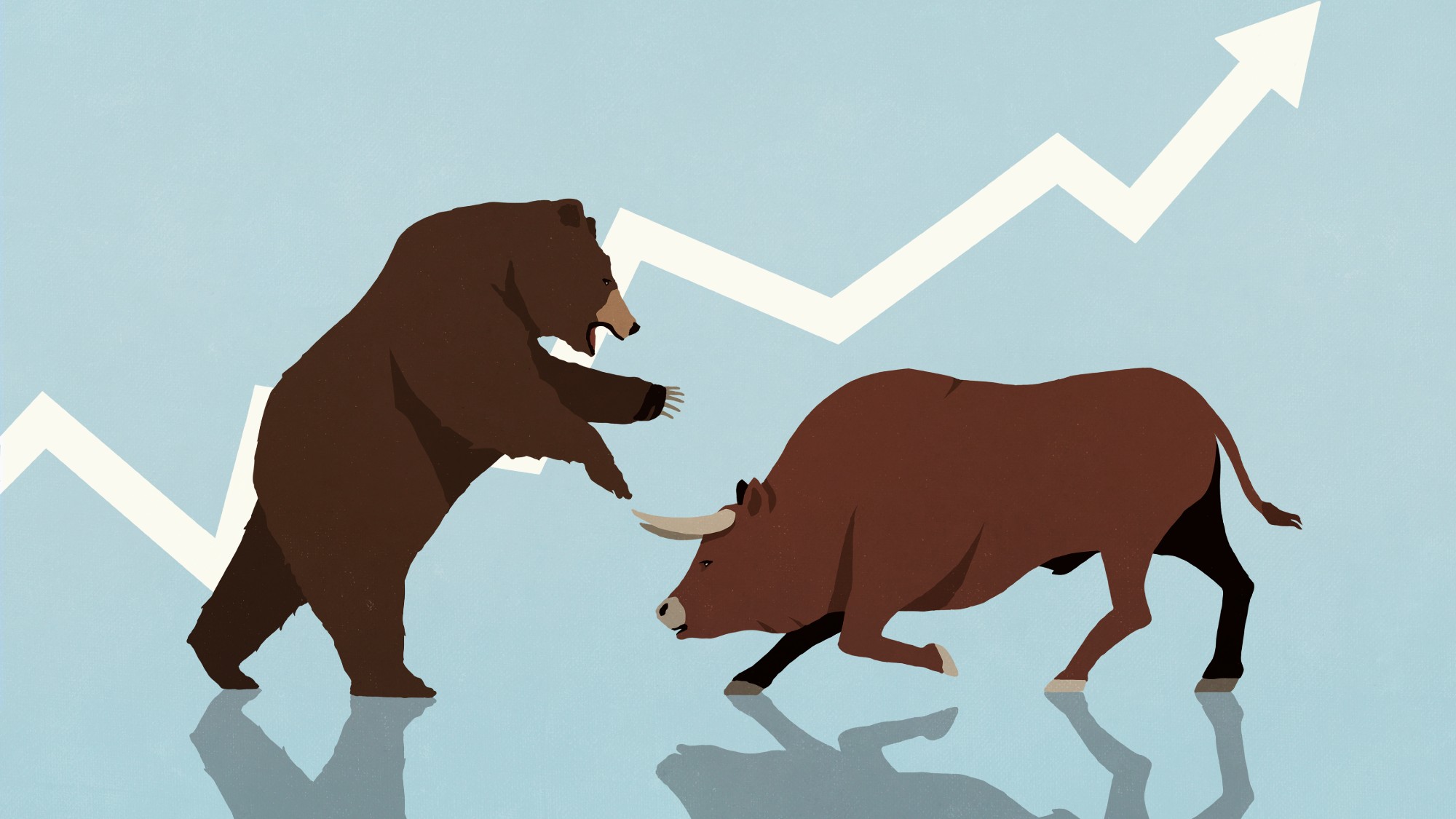Is now a good time to invest in gold?
The price of the 'safe-haven asset' is hitting record highs but some analysts question whether gains will continue

A free daily email with the biggest news stories of the day – and the best features from TheWeek.com
You are now subscribed
Your newsletter sign-up was successful
The price of gold is surging as investors pour their money into the so-called safe-haven asset amid global geopolitical and economic tensions.
Gold prices hit an all-time high of $2,140 an ounce at the start of December and is up by around 13.5% this year.
The increases have been fuelled by renewed tensions in the Middle East triggered by the Hamas-Israel war, and by a weakening US dollar and "expectations of interest rate cuts" both in the UK and across the pond, said MoneyWeek.
The Week
Escape your echo chamber. Get the facts behind the news, plus analysis from multiple perspectives.

Sign up for The Week's Free Newsletters
From our morning news briefing to a weekly Good News Newsletter, get the best of The Week delivered directly to your inbox.
From our morning news briefing to a weekly Good News Newsletter, get the best of The Week delivered directly to your inbox.
But with analysts warning that gold may "struggle to hold onto its gains", said the Financial Times, some investors are questioning whether to add the yellow metal to their portfolios.
What else drives the gold price?
As a "rule of thumb", said Unbiased, the gold price rises when there is uncertainty or negativity in other areas of the market – sometimes as a result of geopolitical instability – and falls when growth is strong.
A "weakening" of the US dollar can also send prices up, the site added, as can natural events such as "good monsoons", as "the affected countries invest more of their wealth and influence global prices".
Beyond economic and political events, a "sudden change to the supply or demand of gold" will influence the price, said the Royal Mint. The price also tends to rise when interest rates are low or inflation is high, as "paper money may lose value, leaving gold with a stronger purchasing power".
A free daily email with the biggest news stories of the day – and the best features from TheWeek.com
How to buy gold
Physical gold bars or coins can be bought from government mints, such as the UK's Royal Mint, and from some precious metal dealers and jewellers.
However, the market is unregulated, warned MoneyWeek, "so there is a risk of scams". To "protect yourself", check whether a dealer is part of the London Bullion Market Association.
Investors can also invest indirectly by purchasing shares in mining or processing companies, or in funds that build portfolios of these firms. "You don't get to own physical gold," said Forbes Advisor, "but you do get exposure to the rise and fall of the price".
Pros and cons of investing in gold
Investing in gold brings the "crucial benefit of portfolio diversification", said The Times Money Mentor, "which means holding assets that move in price independently and differently from each other".
There are "tax advantages" too, as bullion coins purchased from the Royal Mint are classed as legal currency, so are exempt from capital gains tax.
And as a safe-haven asset, said Unbiased, gold can bring "stability to your portfolio". Precious metals typically "preserve and even increase their value" when other assets are struggling.
Investors need to consider the "unexpected costs" of owning physical gold though, said NerdWallet, such as insurance and secure storage.
And despite the recent rises, added Unbiased, gold "is not an especially reliable source of growth", with "nowhere near the returns of equities".
The main purpose of gold as an "investment instrument" is to protect wealth, said The Motley Fool, and "allocating large portions of a portfolio" to the metal will "likely yield poor results".
According to the site, "most financial advisors generally recommend keeping no more than 10% of a portfolio" in gold and other precious metals.
Whether gold is a good investment, and when to take the plunge, also "depends on an individual's investment goals".
Ultimately, gold has "no real intrinsic value", said The Times, as investors don't get any dividends or interest, and the only way to make money is by selling at a profit.
So deciding when to sell is key – but there are no guarantees. The price could tumble if interest rate cuts do not happen as expected next year, but selling now could mean missing out on further gains.
Marc Shoffman is an NCTJ-qualified award-winning freelance journalist, specialising in business, property and personal finance. He has a BA in multimedia journalism from Bournemouth University and a master’s in financial journalism from City University, London. His career began at FT Business trade publication Financial Adviser, during the 2008 banking crash. In 2013, he moved to MailOnline’s personal finance section This is Money, where he covered topics ranging from mortgages and pensions to investments and even a bit of Bitcoin. Since going freelance in 2016, his work has appeared in MoneyWeek, The Times, The Mail on Sunday and on the i news site.
-
 Minnesota's legal system buckles under Trump's ICE surge
Minnesota's legal system buckles under Trump's ICE surgeIN THE SPOTLIGHT Mass arrests and chaotic administration have pushed Twin Cities courts to the brink as lawyers and judges alike struggle to keep pace with ICE’s activity
-
 Big-time money squabbles: the conflict over California’s proposed billionaire tax
Big-time money squabbles: the conflict over California’s proposed billionaire taxTalking Points Californians worth more than $1.1 billion would pay a one-time 5% tax
-
 ‘The West needs people’
‘The West needs people’Instant Opinion Opinion, comment and editorials of the day
-
 Received a windfall? Here is what to do next.
Received a windfall? Here is what to do next.The Explainer Avoid falling prey to ‘Sudden Wealth Syndrome’
-
 How to invest in the artificial intelligence boom
How to invest in the artificial intelligence boomThe Explainer Artificial intelligence is the biggest trend in technology, but there are fears that companies are overvalued
-
 What’s the difference between a bull market and bear market?
What’s the difference between a bull market and bear market?The Explainer How to tell if the market is soaring or slumping.
-
 Is it a good investment to buy a house?
Is it a good investment to buy a house?The Explainer Less young people are buying homes, opting to rent and invest in the stock market instead
-
 What is day trading and how risky is it?
What is day trading and how risky is it?the explainer It may be exciting, but the odds are long and the risks high
-
 What to know about investing in ETFs
What to know about investing in ETFsThe Explainer Exchange-traded funds can be a great choice for beginners
-
 Retail investors drive a flurry of IPOs
Retail investors drive a flurry of IPOsFeature After years of slowness, companies like Klarna and Gemini are reviving the IPO market
-
 Is hands-off investing the way to go?
Is hands-off investing the way to go?The Explainer In many cases, your money might be better off left alone